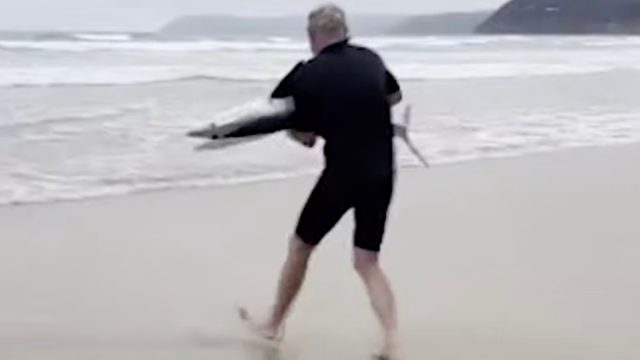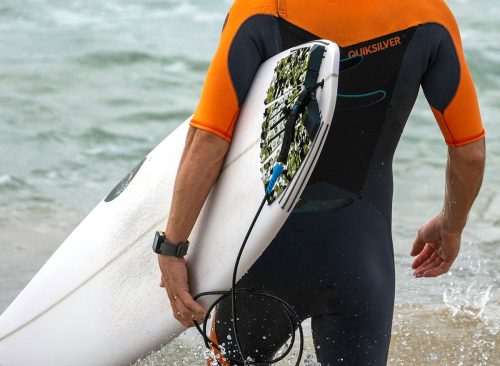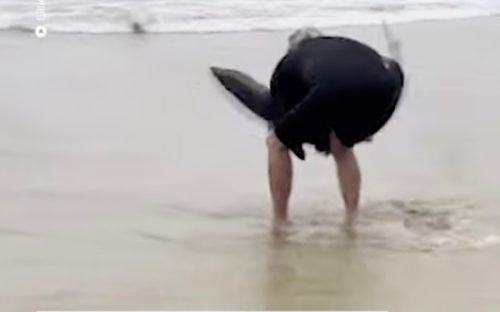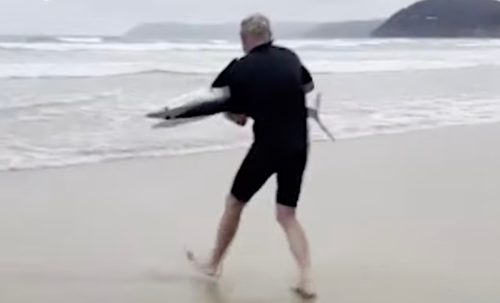Scary Moment Hero Surfer Carries Stranded Shark Back out to Sea in His Arms. “What a Legend!”
“I just thought I’d give it a chance.”

Surfers and sharks aren’t traditionally on the best of terms, but one surfer was willing to put that aside and rescue a shark clearly in distress. Australian surfer Paul Myles, 55, saw a shark stranded in shallow waters, unable to get back into the deeps by itself. Despite difficulty (and danger!) Myles managed to get the predator back into the ocean by carrying it in his arms.
“I think it might earn some brownie points next time a shark comes past me,” he said. Here’s what happened and why Myles went out of his way for the shark.

Myles was enjoying the waves near Eastern View on Victoria’s Great Ocean Road, southern Australia, over the weekend. Eastern View is a favorite spot for Myles—he has been surfing there for over 40 years and says he has rarely seen sharks in that location. “I’ve never seen one that close to the beach, that’s the important thing. I once saw one off the rocks about 20 years ago but that’s enough I think.”

Myles was surfing as usual when he saw something unusual—a shark had strayed too far into the shallows and couldn’t get back out again. The surfer decided to try and help the shark, which turned out to be a lot more complicated than he predicted. “I just thought I’d give it a chance — I wasn’t sure if it was just disorientated or sick or whatever,” he said.

Myles tried using the tip of his surfboard to get the shark towards the deeper water but was unable to move the fish, which he believes was a juvenile blue shark. Blue sharks, even juveniles, can be very dangerous to humans, making Myles’ efforts even more heroic. “It had a long pointy nose, blue color,” Myles said.

After fruitless attempts to get the shark back to safety with his surfboard, Myles bit the bullet and gathered the thrashing animal up in his arms, carrying it into the surf. “I thought I’d get it out in the water a bit further out, see if it would swim out to sea but it didn’t seem too well,” he says, adding he wanted to help because he’s “a bit of a softie, really.”

Myles released the shark safely into the ocean, with beachgoers recording his moves in awe. “I think it might earn some brownie points next time a shark comes past me,” Myles says.
His actions have earned him well-deserved kudos on social media. “What a hero! Thank you for showing kindness,” one commenter said. “Wow what a great human being,” another said. “What a legend!”

Blue sharks, also known as Prionace glauca, are a species of pelagic sharks that are known for their vibrant blue coloration and slender bodies. These sharks are found in the open waters of all the world’s oceans and are often associated with the deeper parts of the water column.
These sharks have a distinctive blue coloration on their upper body and a white or grey color on their underside, which helps them blend in with the blue waters of the open ocean and hide from potential predators.
Blue sharks are known to be fast swimmers and can reach speeds of up to 37 mph. They are also agile and able to make sharp turns quickly.
They are carnivorous and feed on a variety of prey, including fish, squid, and small mammals. They are known to consume large quantities of food in a single feeding and can consume prey up to half their own size.
Blue sharks are known to be solitary animals, but they can also be found in groups. They are migratory and are known to travel long distances between feeding and breeding grounds.
These sharks are considered vulnerable to extinction by the International Union for Conservation of Nature (IUCN). They are often caught as bycatch in commercial fishing operations and are also hunted for their meat, fins, and liver oil.
Blue sharks are known to have a lifespan of up to 20 years in the wild. Despite their reputation as being dangerous to humans, blue sharks are generally not aggressive and attacks on humans are rare. However, they should still be treated with caution and respect, as they are wild animals with sharp teeth and powerful jaws.














